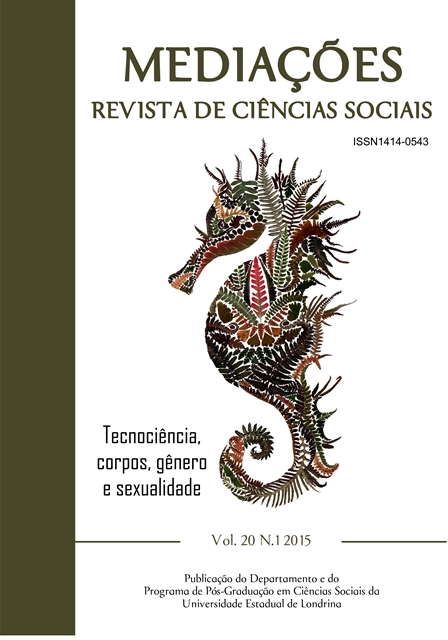Mammalian motherhood? Conceptions about science and nature in a motherhood-oriented social network
DOI:
https://doi.org/10.5433/2176-6665.2015v20n1p217Keywords:
Mammalian, Gender, Nature, MotherhoodAbstract
Assisted by gender and science studies, especially by Londa Schiebinger's works, we aim to reflect upon the notions of nature and scientific evidences which emerge around giving birth and breastfeeding, based on the case study of a blog targeted by mothers who identify themselves as "mammalians". We noticed that the analyzed narratives support themselves in scientific evidences in order to legitimate the ideal of humanization and the notion that women are an extension of nature. Paradoxically, the narratives show that the advocacy of childbirth humanization and breastfeeding is grounded in a biological determinism, which effects towards the perpetuation of unequal gender relations have been pointed out by feminist studies for decades. We have questioned the notion of nature, as portrayed in "mammalian networks", to untie biologizing knots and expose the political power of activism in motherhood-oriented websites.Downloads
References
BADINTER, Elisabeth. O conflito: a mulher e a mãe. Rio de Janeiro: Record, 2010.
BLEIER, Ruth. Science and Gender: A Critique of Biology and Its Theories on Women. New York: Pergamon Press, 1988.
BOWLBY, John. Attachment. New York: Basic Books, 1999.
CARNEIRO, Rosa Maria. De perto e de longe do que seria natural, mais natural e/ou humanizado: uma etnografia de grupos de preparo para o parto. In: FLEISCHER, Soraya; FERREIRA, Jaqueline. Etnografia em serviços de saúde. Rio de Janeiro: Garamond, 2014, p. 243-265.
FAUSTO-STERLING, Anne. Myths of Gender: biological theories about women and men. New York: Basic Books, 1992.
FILLOD, Odile. Oxytocin as Proximal Cause of 'Maternal Instinct': Weak Science, Post-Feminism, and the Hormones Mystique. In: SCHMITZ, Sigrid; HÖPPNER, Grit. Gendered Neurocultures: Feminist and Queer Perspectives on Current Brain Discourses. Viena: Zaglossus, 2014, p. 239-256.
HARAWAY, Donna. Primate Visions: Gender, Race, and Nature in the World of Modern Science. New York: Routledge, 1989.
KELLER, Evelyn Fox. The Gender/ Science System: or, Is Sex to Gender as Nature Is to Science? (1987) In: BIAGIOLI, Mario. The Science Studies reader. New York: Routledge, 1999, p. 234-242.
LAQUEUR, Thomas. Inventando o sexo: corpo e gênero dos gregos a Freud. Rio de Janeiro: Relume Dumará, 2001.
MANICA, Daniela. A desnaturalização da menstruação: hormônios contraceptivos e tecnociência. Horizontes Antropológicos, v. 17, n. 35, p. 198-226, 2001.
NUCCI, Marina. O sexo do cérebro: uma análise sobre gênero e ciência. In: Secretaria de Políticas para as Mulheres. (Org.). 6o Prêmio Construindo a Igualdade de Gênero - Redações, artigos científicos e projetos pedagógicos premiados. Brasília: Presidência da República, Secretaria de Políticas para as Mulheres, 2010 p. 31-56.
ODENT, Michel. A cientificação do amor. São Paulo: Terceira Margem, 2000.
ODENT, Michel. O renascimento do parto. Florianópolis: Saint Germain, 2002.
OUDSHOORN, Nelly. Beyond the natural body: an archeology of sex hormones. London: Routledge, 1994.
POMBO, Carolina. A mãe e o tempo: ensaio da maternidade transitória. Rio de Janeiro: 2013.
POMBO, Carolina; NUCCI, Marina. Por que somos mamíferas?, 2014 Disponível em: . Acesso em: 22 fev. 2015.
ROHDEN, Fabíola. O homem é mesmo a sua testosterona: promoção da andropausa e representações sobre sexualidade e envelhecimento no cenário brasileiro. Horizontes Antropológicos, v. 17, n. 35, p. 162-196, 2011.
ROHDEN, Fabíola. Império dos hormônios e a construção da diferença entre os sexos. História, Ciência, Saúde - Manguinhos, v. 15, supl., p. 133-152, 2008.
ROBAYO, Margarida. Leite: Notas sobre a cruzada da amamentação. Revista Piauí, n. 98, p. 54-58, novembro, 2014.
SCHIEBINGER, Londa. Skeletons in the Closet: The first illustrations of the Female Skeleton in Eighteenth-Century Anatomy. Representations, n. 14, p. 42-82, 1986.
SCHIEBINGER, Londa. Mamíferos, primatologia e sexologia. In: PORTER, Roy; TECH, Mikolas. Conhecimento sexual, ciência sexual. São Paulo: Editora Unesp, 1998, p. 219-246.
TORNQUIST, Carmen. Armadilhas da nova era: natureza e maternidade no ideário da humanização do parto. Revista Estudos Feministas, Florianópolis, v. 10, n. 2, p. 483-492, 2002.
WIJNGAARD, Marianne. Reinventing the Sexes: the biomedical construction of femininity and masculinity. Bloomingtom Indianapolis: Indiana Univ. Press, 1997.
Downloads
Published
How to Cite
Issue
Section
License
Copyright (c) 2015 Fernanda Vecchi Alzuguir, Marina Fischer Nucci

This work is licensed under a Creative Commons Attribution 4.0 International License.
Copyright on articles published in Mediações belongs to the author(s): in the case of partial or entire republication of the original publication, we ask author(s) to indicate the original publication in the periodical.
Mediações uses the Creative Commons Attribution 4.0 International license, which allows Open Access, enabling any user to read, download, copy and disseminate its content so long as adequately referenced.
The opinions expressed by the author(s) are their sole responsibility.

































